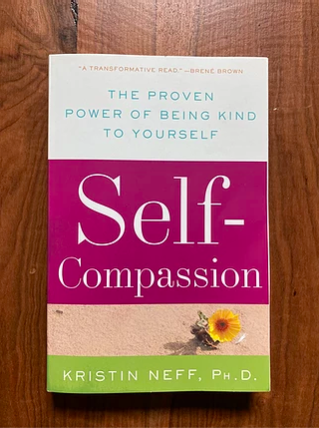
We live in a culture that teaches us to be self critical. We grow up internalizing the ideal that we must push ourselves to achieve greatness. It’s easy to put high expectations on ourselves leading to brutal self criticism when we can’t meet those expectations.
Dr. Kristin Neff put together a beautiful book explaining why we are critical of ourselves and what we can do about it.
Self compassion is extending the same compassion to yourself that you would to a good friend. Dr. Neff explains that self compassion is composed of three parts: mindfulness, common humanity and self kindness.
While I completely agree with her work I was a little bothered by her tone in the book. It was a little too laid back for me. I also would have appreciated more concrete examples and details from her research. Dr. Neff used many anecdotes from her own life in the book to illustrate her points, which is ok but I think the combination of the tone with the anecdotes was a little off putting. These critiques are not enough of a reason to skip the book. It is still a worthwhile read. I believe it’s important to understand why we are self critical and learn to cultivate self compassion. The book provides examples and tools that you can use to cultivate self compassion.
I will leave you with a mantra from her book that I think is particularly helpful:
“This is a moment of suffering.
Suffering is part of life.
May I be kind to myself in this moment.
May I give myself the compassion I need.”
Dr. Kristin Neff put together a beautiful book explaining why we are critical of ourselves and what we can do about it.
Self compassion is extending the same compassion to yourself that you would to a good friend. Dr. Neff explains that self compassion is composed of three parts: mindfulness, common humanity and self kindness.
While I completely agree with her work I was a little bothered by her tone in the book. It was a little too laid back for me. I also would have appreciated more concrete examples and details from her research. Dr. Neff used many anecdotes from her own life in the book to illustrate her points, which is ok but I think the combination of the tone with the anecdotes was a little off putting. These critiques are not enough of a reason to skip the book. It is still a worthwhile read. I believe it’s important to understand why we are self critical and learn to cultivate self compassion. The book provides examples and tools that you can use to cultivate self compassion.
I will leave you with a mantra from her book that I think is particularly helpful:
“This is a moment of suffering.
Suffering is part of life.
May I be kind to myself in this moment.
May I give myself the compassion I need.”


 RSS Feed
RSS Feed